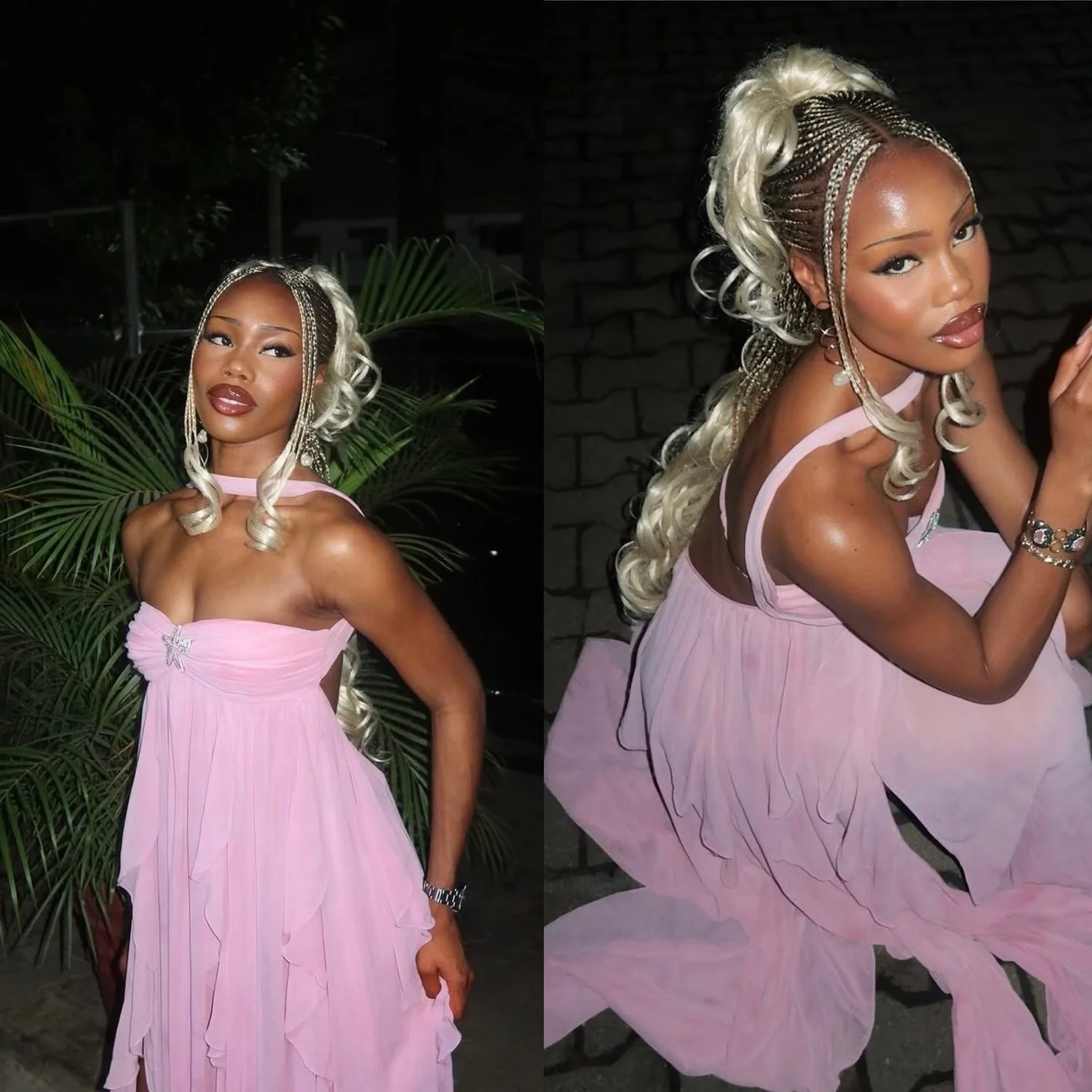What Are Women In Lagos Wearing This Winter?
How can we celebrate the women of Lagos in light of the controversy from Detty December?
It's no secret that Lagos has been the subject of many widespread discussions this winter. As is the case every year and every Detty December, accumulating A-list celebrities and social media personalities into one space facilitates some interesting discourse. But this past year saw increased friction between Nigerian natives and those passing through for the season.
According to the UN's population fund, nearly two-thirds of the Nigeran population is under 25. Lagos is the perfect holiday destination for foreign nationals, particularly those of Nigerian heritage (IJGBs) within that 18-25 range. Travelling to Nigeria, in addition to Ghana and South Africa, for a season of partying and enjoyment away from torrential British weather has been an age-old tradition. In addition to attending popular beach club events and parties by IJGBs, many locals also utilise this time to blow off steam, constituting a blend of the British and Naija scenes.
But where negative stereotypes and expectations of hospitality are imposed on the local population, a controversy took root, centring one of the UK's most popular media personalities within the black community, Madame Joyce, or Joyce-Anne Deji, following a video posted sharing her negative experience on a night out in Lagos.
In the video, she complained about Lagos babes not responding to her greeting in public as if she wanted to 'steal their man' whilst commenting on their general hostility.
In the court of public perception, a wave of mixed opinions emerged regarding the matter at hand. However, the discussion wasn't divided along national lines—Nigerian and British—but reflected various perspectives. On one side, in-depth analyses and video essays suggest this narrative highlights feelings of Western superiority.
It also points to the parentification of Internationally Just Graduated Blacks (IJGBs), who might feel entitled to a warm welcome as tourists. Critics argue that this narrative, which portrays Nigerian women as typically 'unfriendly', exploits stereotypes about aggressive African women. In reality, IJGBs are not entitled to a certain level of camaraderie from strangers. On a more extreme note, some comments began to target Madame Joyce's appearance, further perpetuating rumours of an unfriendly and competitive environment despite valid critiques of the narrative.
But amid internet-wide discourse dramatizing the situation, it seems as if those involved in the root of this discussion, namely Madame Joyce herself, having been spotted with A-list celebs Tyla, Tems, Arya Starr at an Obi's' House event, proved that not only was she unbothered, but that she was the high profile celebrity she had claimed to be initially. Conversely, it became clear that her accusations of an inhospitable female population weren't necessarily based on an accurate representation of Lagos' young women.
But besides controversial discourse, could we be looking at how Nigerian women inspire positive discussion?
Perhaps there is more about Naija women to focus on other than their level of hospitality to IJGBs. For example, the beauty and style exhibited by some of the names circulating the media are far more engaging than the controversy they're involved in. The Obi's house event on Dec. 23rd appeared to be the event of the season if not one of it's highlights, where Arya Starr, Tems, Madame Joyce, and Tyla were illuminating, captured on all of our screens.
Nigerian superstar Arya Starr could be seen wearing a cut-out embroidered black halter top and matching skirt, simple yet classy jewellery and sporting a pixie cut, a perfect blend of modern sophistication and bold self-expression, reflecting her ability to balance simplicity with a striking presence.
Stood next to her, Tyla, the South African pop princess, and Tems, a Nigerian R&B, Afropop and Afrobeats artist, who was seen wearing a gorgeous black cut-out mesh dress paired with a hairstyle she has become known for wearing.
The cut-out patterns and alluring character shown by some of the looks are reminiscent of that Y2K style that was popularised and has resurfaced recently, which Nigerian women initially helped to set the tone for.
Nigeria's early-2000s Nollywood films experienced a resurgence among millennials and Gen Zers, both in Nigeria and the diaspora, where this shift is driven by a growing appreciation for the era's glamorous and youthful aesthetic, which resonates with today's nostalgic desire for Y2K fashion and culture. As such, Detty December parties often feature outfits that remind us of classic looks, allowing attendees to reconnect with a pivotal moment in Nigerian pop culture.
Celebrities are helping to proliferate this essence whilst incorporating a modern twist that accentuates and celebrates the female body, but what about those influencers whose fanbases are a combination of both Nigerians and Brits?
Temi Ojora
23-year-old fashion, beauty, and lifestyle influencer Temi Ojora—aka TOJ—has showcased a variety of looks this winter.
In the first look, Ojora is wearing a thin-strapped brown Skims bodysuit paired with simple baggy jeans, accessorized with gold jewelry. This outfit reflects trends that have been popular in the UK for years.
However, my favorite look of hers is the 'fairytale' style dress, as she refers to it in her caption. It features pink chiffon with an added scarf detail. Compared to her earlier outfit, this dress feels more true to her personal style, rather than being influenced by external trends. It captures her dream-like essence and showcases a doll-like femininity more than anything else.
Diana Eneje
Similarly, the successful 22-year-old model and fashion influencer Diana Eneje graced us with many looks perfect for both evening and daytime this winter.
Here, she is seen in the white top and denim shorts combo with her hair in pigtails. As those familiar with her know, she exudes an effortless beauty, supplemented here with gold jewellery from Acid-Base that highlights her innate elegance in classic Nigerian style.
In a second outfit captured in a picture captioned, "Black dress is one of my personalities," she wears a Blazed World black halter neck dress with exquisite detailing, complemented by red nails and a black bag. This look showcases her unwavering commitment to timeless allure.
As the party season comes to an end, we have the opportunity to reflect on more than just the drama that unfolded. By looking beyond the events in Lagos, we can explore the multifaceted identities of its women, who are increasingly shaping the global conversation on style. In this way, Nigerian women not only challenge pre-conceived notions but are confidently forcing us to view them for their inspiring sense of style.









